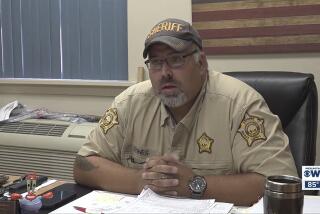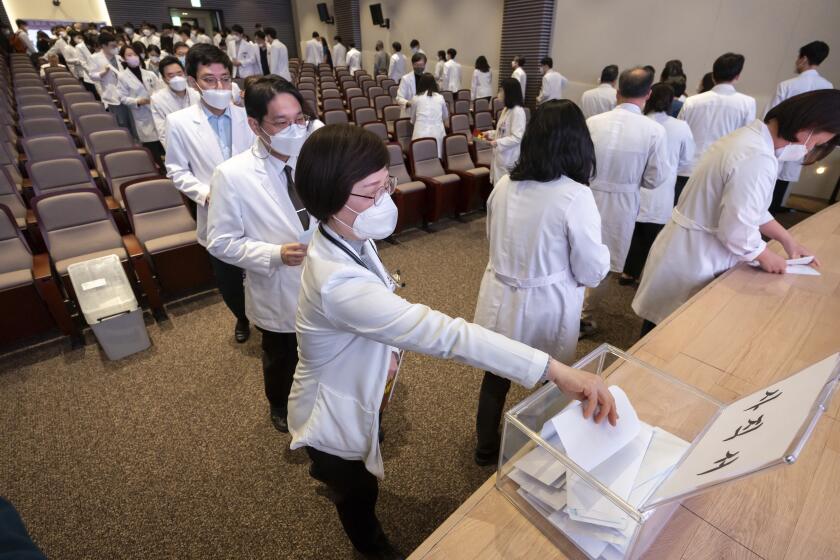Bishops Uphold Church Tenets on Celibacy and Divorce
Roman Catholic bishops gathering here from all over the world broached taboo topics and gave the public rare glimpses of policy debate within the Vatican. But as the three-week meeting draws to a close today, the clerics have chosen not to break new ground or stray from tradition.
The Synod of Bishops on Saturday approved a 50-point package of “propositions” to be handed to Pope Benedict XVI that reinforced long-standing policies, including an enthusiastic endorsement of celibacy for priests and the denial of Communion to Catholics who have divorced and remarried.
Although the critical shortage of priests dominated deliberations, the bishops recommended maintaining the church’s ban on married priests, according to information released by the Vatican and first reported in the Catholic press. They also encouraged a greater use of Latin in religious services.
These elements will disappoint liberal Catholics, especially in the United States, who had noted earlier indications that some changes might be considered, but they are in keeping with Benedict’s staunchly conservative theology.
The Vatican did not give a tally of the votes cast behind closed doors Saturday, but Cardinal George Pell, the archbishop of Sydney, Australia, said at a news conference afterward that there was considerable consensus.
“If you restate the central doctrinal positions of the church with a massive unanimity on the nature of the Eucharist, that’s something,” Pell said, referring to the church’s most important sacrament. “And if you reaffirm a particular discipline, or two or three disciplines, that’s also something.”
We Are the Church, an international organization of liberal Catholics, said in a statement Saturday that it “welcomes the openness” of the synod’s debates but regrets the bishops’ “lack of courage.”
This first major church meeting in Benedict’s 6-month-old papacy will formally conclude today with a Mass at St. Peter’s Basilica. The pope will preside.
The synod is an advisory body that meets every two years. This session drew more than 250 bishops from 118 countries and was officially dedicated to the Eucharist, the Holy Communion in which Catholics believe a priest transforms bread and wine into the body and blood of Christ. Only a priest can consecrate the Eucharist.
Ahead of this synod, Benedict changed the format to allow for open-floor discussions at the end of each session. That suggested to many a climate of freer debate not seen during the long papacy of John Paul II. Journalists were provided with details on what was discussed. However, a few days into the synod, with hot topics making headlines in the local media, the Vatican abruptly restricted the release of information.
The synod also provided the first opportunity for many bishops to see the new pope in action and to understand the new political dynamics at the Vatican.
“Everyone is looking to see who is saying what, and who is listening to whom,” said a senior prelate who participated in the synod. He spoke on condition of anonymity after the Vatican clampdown.
Judging from speeches and briefings during the synod, it appears that the arguments of bishops and cardinals more closely tied to the Roman Curia, or Vatican administration, won out over the flexibility proposed by bishops from more distant dioceses, participants said.
The shortage of priests has left pulpits empty in many parts of the world.
Brazilian Cardinal Claudio Hummes, the archbishop of Sao Paolo, illustrated the problem this way: In the world’s largest Catholic country, he said, Protestant pastors outnumber Catholic priests 2 to 1.
Struggling with ways to overcome the shortage, some delegates early in the synod raised the possibility of allowing married men to be ordained.
Among proposals was the ordination of “viri probati,” a Latin term meaning “tested men” that refers to older, married men who have led exemplary religious lives and might be considered worthy of the priesthood. Members of the Eastern Rite churches, which follow Eastern Orthodox traditions but are loyal to the pope, pointed out that they allow priests to marry.
In the end, however, the bishops endorsed “the priceless gift” of priestly celibacy and said allowing married men into the priesthood was “a road not to follow.”
The shortage “worries us a great deal,” the bishops said, “and invites us to pray and more actively promote vocations.”
During synod debates, Archbishop John Atcherly Dew of Wellington, New Zealand, challenged the Vatican to consider allowing divorced Catholics who remarry to receive Communion. Under church doctrine, a divorced Catholic who remarries without obtaining an annulment -- and there are millions -- is living in sin. These people are officially not entitled to Communion.
“Our church would be enriched if we were able to invite dedicated Catholics, currently excluded from the Eucharist, to return to the Lord’s table,” Dew argued.
But he was quickly shot down by Cardinal Francis Arinze, a senior Vatican official, who said that Communion “is not something that we own and that we can give out to whoever we want, to our friends, to those who suffer.”
The synod’s final recommendation approved Saturday called for the church to embrace divorced Catholics, encouraging them to participate in the Mass but not approach the altar for Communion. Several conservative Curia officials wanted the tougher language because they feared a softer line would encourage divorce, a synod participant said.
Archbishop William J. Levada, former prelate of San Francisco and now the Vatican’s chief enforcer of church doctrine, asked the synod to discuss whether a Catholic politician who does not support certain church policies can be allowed to take Communion.
The question of whether U.S. politicians, like Sen. John F. Kerry (D-Mass.), who support abortion rights can receive sacraments has been divisive for American Catholics.
Cardinal Alfonso Lopez Trujillo, head of the Pontifical Council for the Family, was adamant that politicians who support abortion rights, gay marriage and other “violations of natural law” had no right to take Communion.
The final synod document, however, stopped short of a blanket ban, urging priests to insist that parishioners adhere to church teachings but take “local situations” into account when deciding whether to deny Communion to politicians.
More to Read
Sign up for Essential California
The most important California stories and recommendations in your inbox every morning.
You may occasionally receive promotional content from the Los Angeles Times.











